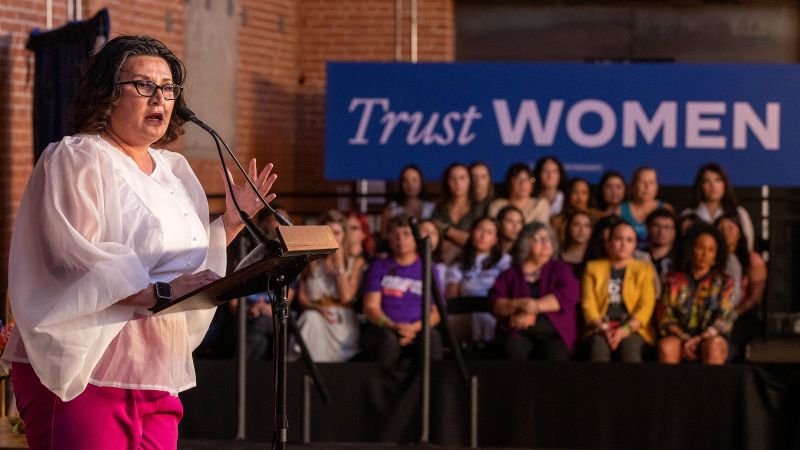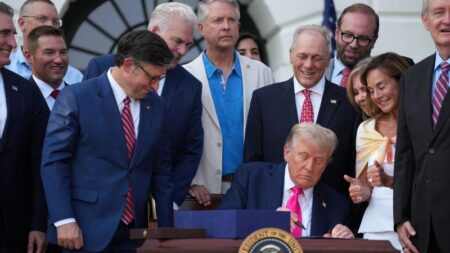The landscape of U.S. politics is undergoing a seismic shift as Democrats strategically use personal narratives to critique President Donald Trump’s immigration laws and domestic policies. Rather than relying solely on statistical analyses or party lines, many candidates are drawing on their life experiences and the stories of those affected by the proposed legislative cuts. This approach aims to challenge Republican narratives while humanizing their stance on crucial social safety net programs.
For instance, Randy Villegas, campaigning against California Republican Rep. David Valadao, shared that his mother’s prenatal care was funded through Medicaid, underscoring the importance of this program. Similarly, JoAnna Mendoza, running against two-term Republican Rep. Juan Ciscomani in Arizona, emphasizes how assistance programs allowed her to serve in the Marines. These personal stories effectively illustrate the far-reaching implications of domestic policy decisions, particularly for vulnerable populations.
First-time candidate Deja Foxx, hailing from a single-parent household, is also leveraging her background as a powerful narrative tool in her campaign for the upcoming July 15 Democratic primary. She expressed a profound understanding of the urgency surrounding these issues, citing her lived experience with policies central to the debate. By focusing on personal narratives, candidates like Foxx aim to draw a clear contrast with their opponents, who may seem detached from the realities faced by average families.
Amplifying these personal stories is a longstanding tactic for Democrats—one that hopes to frame Trump’s legislative agenda, referred to as “One Big Beautiful Bill,” as detrimental to American families. This narrative challenges the Republican framing of those reliant on social safety nets as unwilling to work or engaged in fraudulent activity. It invokes a more empathetic understanding of poverty and assistance, particularly as Mendoza highlights the stigma her own family faced in seeking government aid as farmworkers.
Mendoza’s ongoing campaign activities, such as local listening sessions with constituents, stand in stark contrast to Ciscomani, who has reportedly been less accessible. Such grassroots engagements illustrate how Democrats are positioning themselves as champions of the people, combating the narrative that Republicans are the only party capable of addressing border security and welfare reform.
Political dynamics also play a significant role in these campaigns. Democrats, in light of the controversial Supreme Court Dobbs decision affecting reproductive rights, refined their strategies through storytelling. However, the prevailing concern remains that economic issues overshadow social ones, as demonstrated in CNN exit polls, where a clear majority prioritized economic management over abortion rights when voting.
As Democrats aim to regain the trust of working-class voters, they argue that reductions in social programs benefit wealthier individuals through trickle-down policies. Villegas captured this sentiment, stating the necessity for an economic populist message that resonates more with the necessities of everyday Americans rather than catering to billionaires.
On the opposite end of the spectrum, Republicans are adamantly framing the new law, which includes welfare reform, as a means to enhance border security and ensure integrity in programs like Medicaid. The National Republican Congressional Committee asserts that Democrats have unwittingly provided a means to reinforce the GOP’s image as more attuned to the struggles of working Americans.
Interestingly, while most Republicans supported the welfare-related legislation, a notable exception is Rep. Brian Fitzpatrick of Pennsylvania, who dissented. The GOP is attempting to promote the narrative that their adjustments to Medicaid will ultimately sustain support for those genuinely in need, even as critics warn that many eligible may find themselves excluded due to added bureaucratic barriers.
In terms of impact, an alarming projection suggests that approximately 11.8 million people could lose Medicaid coverage under the new legislation, primarily due to rigorous work requirements and the repeal of simplified eligibility rules instituted by the Biden administration. Similarly, changes to the Supplemental Nutrition Assistance Program (SNAP) now impose stricter criteria on caregivers and adults nearing retirement age, putting critical assistance at risk for countless individuals.
Republican strategist Rob Stutzman highlights the challenge this presents for GOP candidates, many of whom find it increasingly difficult to champion entitlement programs. However, he suggests a dual opportunity for Republicans to not only underscore positive bill provisions but also to strategically frame these Medicaid changes as part of a broader return to pre-administration policies.
Conversely, Democrats assert that the abrupt enforcement of work requirements will leave many working families vulnerable. Noah Widmann, a candidate from Florida, openly critiques these new regulations as excessively burdensome for those legitimately needing support. He poignantly posits that denying even a single family essential healthcare is fundamentally wrong.
As the political battle continues to unfold, the differing narratives and their implications on public perception will undoubtedly influence the trajectory of upcoming elections and government policy. The challenges, victories, and strategies showcased by both parties will shape the political landscape for years to come, reflecting the complex interplay between personal stories and legislative policies in defining the future of American governance.











